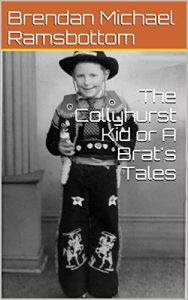“The Collyhurst Kid or A Brat’s Tales” is a unique collection of one man’s reminiscences, capturing life in the 50’s and 60’s urban sprawl of the slums of Manchester. Post war Manchester offers a stark contrast to holidays spent by the author in the idyllic poverty of the West of Ireland. In a series of recalled events that shaped a very average life the author invites you to meet those whose influence impacted upon him and provided the backdrop to what was a very happy childhood. There is humour, tragedy, pathos and excitement in these pages.
Illustrated throughout from the authors personal collection of family snaps it offers an insight into a time gone by and one which those who lived it will feel an affinity with.
Updated and published as a third edition in March 2016 the author moves into a more autobiographical mode writing more about the places he lived in: Collyhurst, Langley Estate, Heywood andTodmorden as well as about the schools' where he taught: St. Wilfirid's, Whitworth; Sutheraland High School, Heywood; the Queen Elizabeth School, MIddleton; and the Headways Prgoramme, Rochdale. The book finishes with an update on the authors retirement.
Extract:
I suppose for me it all began at number 27 Railway Street in the Manchester district of Collyhurst. It was January 1952. The war was over and people were soon to be told they "never had it so good" and I guess that's true of my own experiences. Born in mid-century, a child of the slums, “Hope” was the middle name of every child born at that time. Hope, for a better future, hope, for a better way of living, hope, that we'd seen an end to war. To a greater or lesser extent that's certainly been the case for me. It's definitely true that no one in my generation had it as tough as their parents, just as the next generation will find it just a tad easier for them because of our experience. I suppose that, such is life down the generations
EXTRACT 2:
We sat in a rough circle with Brian at the head. He sat with his legs lightly crossed at the ankles and his two arms splayed out behind him. He was in full throttle when a big St. Bernard trotted over sniffed at his back, cocked a leg and began to pee on his back. We were in absolute bulk and collapsed in fits of laughter. Brian didn’t register the damp for a moment or two, so pleased with himself and the effect his story was obviously having. As the dampness grew damper he glanced over his shoulder and found himself staring at this huge St. Bernard which finished its business and with a deadpan expression scraped it’s forepaws in the grass before trotting off to Brian’s belated roar of, “Dirty b*****d”.
Illustrated throughout from the authors personal collection of family snaps it offers an insight into a time gone by and one which those who lived it will feel an affinity with.
Updated and published as a third edition in March 2016 the author moves into a more autobiographical mode writing more about the places he lived in: Collyhurst, Langley Estate, Heywood andTodmorden as well as about the schools' where he taught: St. Wilfirid's, Whitworth; Sutheraland High School, Heywood; the Queen Elizabeth School, MIddleton; and the Headways Prgoramme, Rochdale. The book finishes with an update on the authors retirement.
Extract:
I suppose for me it all began at number 27 Railway Street in the Manchester district of Collyhurst. It was January 1952. The war was over and people were soon to be told they "never had it so good" and I guess that's true of my own experiences. Born in mid-century, a child of the slums, “Hope” was the middle name of every child born at that time. Hope, for a better future, hope, for a better way of living, hope, that we'd seen an end to war. To a greater or lesser extent that's certainly been the case for me. It's definitely true that no one in my generation had it as tough as their parents, just as the next generation will find it just a tad easier for them because of our experience. I suppose that, such is life down the generations
EXTRACT 2:
We sat in a rough circle with Brian at the head. He sat with his legs lightly crossed at the ankles and his two arms splayed out behind him. He was in full throttle when a big St. Bernard trotted over sniffed at his back, cocked a leg and began to pee on his back. We were in absolute bulk and collapsed in fits of laughter. Brian didn’t register the damp for a moment or two, so pleased with himself and the effect his story was obviously having. As the dampness grew damper he glanced over his shoulder and found himself staring at this huge St. Bernard which finished its business and with a deadpan expression scraped it’s forepaws in the grass before trotting off to Brian’s belated roar of, “Dirty b*****d”.






